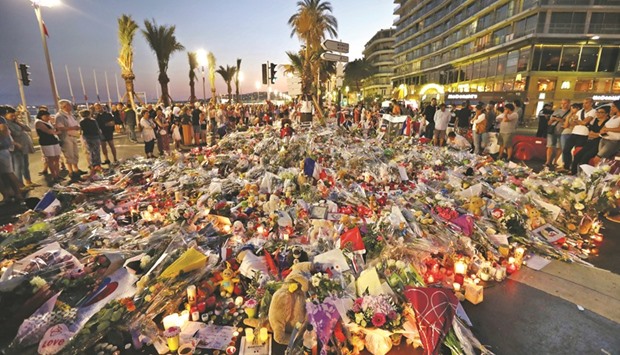France’s government, smarting from accusations that it did not do enough to prevent last week’s deadly truck attack in Nice, asked lawmakers yesterday to extend a period of emergency rule that gives police greater search-and-arrest powers.
President Francois Hollande said that his government was planning a three-month extension but, in response to calls from political opponents, could accept calls for a rollover lasting six months.
“Protecting the French people is my duty,” he said during a visit to Portugal.
Polls since the attack in the Riviera coast city of Nice suggest confidence in his ability to fight terrorism has plunged after the third major attack in 18 months.
Crowds jeered Prime Minister Manuel Valls at a remembrance ceremony on Monday.
“We need people to stay together, we want to move fast with broad backing,” said government spokesman Stephane Le Foll as lawmakers prepared to debate the latest emergency powers bill.
The debate came as Nice’s seafront boulevard, the Promenade des Anglais, reopened after Thursday’s attack, in which Tunisian Mohamed Lahouaiej Bouhlel drove a truck into crowds of Bastille Day revellers, killing 84, before being shot dead by police.
Dozens more were hurt and 19 people remain on life support five days after the carnage French state prosecutor Francois Molins has described as a terrorist act.
The Islamic State (IS) group that has seized control of parts of Syria and Iraq has claimed responsibility for the attack, although no hard evidence linking Bouhlel to the militant organisation has been found.
Hollande said French fighter jets had intensified bombing of Islamic State bases in Syria and Iraq in recent days.
Molins said that Bouhlel had shown sudden signs of interest in hardline Islamist propaganda in the days before he ran amok but up to then had no record of radicalisation, noting that the killer ate pork, drank alcohol and engaged in “unbridled sexual activity”.
As tension ran high over risks of further attacks in France, police officials also confirmed that explosives had been found at the home of an arrested taxi driver who was on an intelligence services watchlist.
They were also called in to investigate an incident in which a man attacked a woman and her three children with a knife at a holiday complex in southern France.
Some witnesses said that the assailant had accused the victims of dressing too scantily.
The number of French people who believe Hollande is up to the task of tackling terrorism plunged to 33% after the attack in Nice, from confidence ratings of 50% or so in the wake of the two other big attacks in early and late 2015.
France imposed emergency rule after the November 13 attacks in which Islamist militants killed 130 people in Paris, giving the police powers to search homes and place people under immediate house arrest without advance clearance from judges.
The bill to be debated in parliament would also grant police and spy services greater powers to dig into suspects’ computers and mobile phone communications.
Another poll published yesterday asked voters who they did not want to see elected leader of France next June: 73% said Hollande, but the percentage hostile to far-right leader Marine Le Pen, who some believe will benefit from a climate of voter alienation, topped 60%.

People stand in front of flowers, candles and messages laid at a makeshift memorial in Nice late on Monday, in tribute to the victims of the deadly attack on the Promenade des Anglais seafront which killed 84 people.
